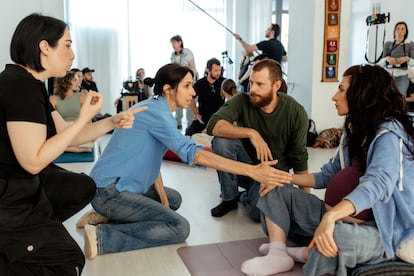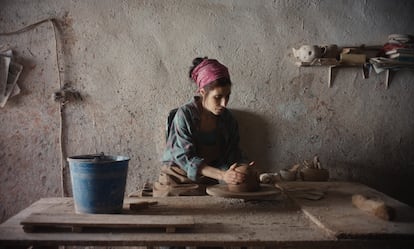In the 2023 Goya Awards, the short film Sorda, From Eva Libertad and starring her sister, actress Miriam Garlo opened Spanish cinema to the exploration of the worlds and problems of deaf people, such as Garlo since she was seven years old. The short has grown over a long one, and although the title has been maintained, the protagonist actress and the name of her character, the story has little to do. And the emotion grows, as noted in the reception in the Berlinale, the first festival in which the film is projected, where it has been seen in the Panorama section. “With everything,” says the director hour before her premiere, “I never wanted to do a thesis about deafness with this film, but is born from the desire to explore the link between the deaf world and the listener, which is what Miriam and I have lived our whole life. When writing to Angela, I did not want to make an exemplary deaf, or that it was the representative of anything, because that is impossible: there are so many ways to live the deafness as of being a listener. When there are groups, groups or communities that have not had sufficient representation in the cinema, their first portraits have a lot of weight, but we cannot assume that burden. ”
And for that Sorda excites: as Eva Libertad points out, its protagonist is “mother, couple, daughter, has dogs, is pottery and is also deaf.” Beside him, his sister, whose experiences, considering being a mother promoted the script of the length, underlines it: “I do not consider myself a representative of the deaf community. That group houses very different people. All we share is that we don’t hear the rest. I am not even the only actress. Now, opportunities are missing, but I am not the only one. Because of the invisibility we are not enjoying the wealth that the human being incorporates. This character wanted him to have a lot of complexity, which could also be selfish or behaved badly. ” As an example of a character construction, while Angela hardly speaks, Garlo does, although she listens to her sister’s questions and answers through an interpreter who signs them.
Would it have existed Sorda Without one of the two? The director replies: “Miriam told me once I was recorded. When we were starting the process, he confessed to me: ‘Do you realize that we have been preparing for this without knowing?’ I can tell this story because Miriam is deaf and she is my sister. I know the deafness for her. I don’t know anything about other disabilities. Because as a society we are not educated, we are not sensitized to relate to diversity or disabilities. ”
The protagonist of Sorda, Ángela, lives in the Murcian countryside (the sisters were born in Molina de Segura; Eva Libertad is the oldest) with a boy who loves him – found with much sweetness for Álvaro Cervantes as the director of the director – and dedicated to pottery. When they get pregnant, their fears begin, they explode when the girl is born: will it be deaf? Will he hear? To the fear of not being a good mother, uncertainty within the couple adds, in which the daughter can throw towards the listener or to the deaf.
It is also, to some extent, the world of Garlo, which in its curriculum has two careers, two masters and a doctoral thesis, in addition to cinema and theater with their sister. “The short was a kind of haiku, a seed that also confirmed the piece of actress that is Miriam,” recalls the director. The aforementioned assures that she has felt the great leap to the length “because Angela has become adult, lives other problems and her context requires another maturity.” Sorda Reaches as far as they did not arrive or French The Aries familia, nor its American adaptation, CODA, that ended up winning the Oscar. If, in his commitment to the construction of sound, silence and vacuum, Sound of Metal Be close, but in Sorda There are many more pieces. After its premiere in the Berlinale, you will compete in the next edition of the Malaga contest to finally premiere in rooms on April 4.
Both say that in the filming they prepared the rest of the technical team and that they had signs interpreters (”a need that I have not enjoyed before in my working life,” says Garlo). “In the end, cinema is a reflection of society,” the director starts. “Luckily, in recent years we have seen how the hegemonic figure traditionally after the camera, that is, white and heterosexual man, has been dynamited and other creators and creators who open worlds, who check old issues and recover them are entering. That is very good, but in the issue of disabilities we have a lot of delay as a society. I have seen how Miriam has signed up for an interpretation course, by curriculum they have accepted her, and when she said it was deaf, the answer is that it was not an accessible course. This does not happen with sexual identity and orientation, or with ethnic or geographical origin. ”

Within the thematic richness of Sorda There is talk of the overestimulation suffered by today’s society, with multiplied visual and sound stimuli – “that is why the noise and its absence in the footage is so present, and that is why sometimes the speed in their communication of deaf people seems more human that the acceleration that surrounds it, ”says the director. Also of the shame that is felt when signing or using headphones: “I wore headphones for 10 years,” Garlo recalls. “And they began to change the character. Because I could not understand where many sounds came from, I could not digest the conversations, and in the end I made the decision that I preferred to have control over my order and my internal cleaning. And the shame he also felt came to the script in one of the last layers ”, in the character of a child who spends him badly when he goes with his two mothers, deaf, or with Angela covering the headphones with his hair. “It conceals, because inside the human being the desire to be accepted.”
And why is Angela Alfarera? “Because in Murcia there is a tradition of pottery of many years,” says Eva Libertad. “In addition, since I imagined Angela I wanted to reflect how in the deaf world hands are a positive symbol, because you communicate with them. So I was clear that I had to work with those hands. ”

